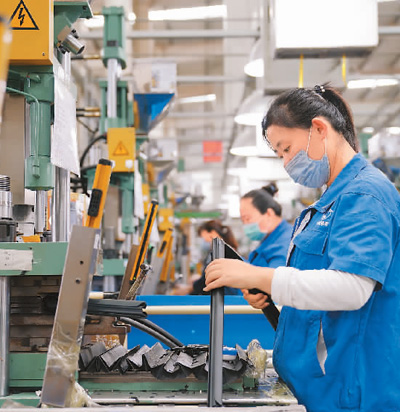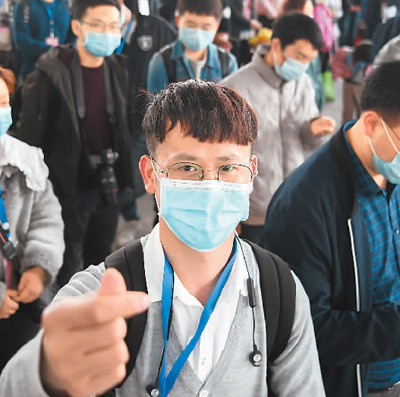

The Chinese central government and local governments have taken frequent, prompt and practical measures to stabilize and guarantee employment in order to overcome the impact of the novel coronavirus (COVID-19) outbreak.

Qinghe county in north China’s Hebei province gives priority to local laborers who haven’t been able to leave their hometowns to work as migrant workers, while making efforts to promote resumption of work and production. Qinghe county is an important auto parts manufacturing base in northern China.(Photo by Mu Yu/Xinhua)
China has always attached great importance to six key areas in its efforts to stabilize and guarantee performance, namely employment, finance, foreign trade, foreign investment, domestic investment, and market expectations.
The country has intensified its efforts to guarantee employment for people across the country, with particular attention being paid to key industries and key groups since the outbreak of the COVID-19 pandemic.
Supportive policies for worst-hit Hubei province
As the province in China hardest hit by the pandemic, central China’s Hubei has enjoyed a great deal of support from the central government in its efforts to stabilize employment.
An official document released by the General Office of the State Council on March 20 pointed out that the relevant departments should enhance support for employment in areas hit hard by the pandemic, including Hubei.
One-off subsidies should be provided for students who are about to graduate from colleges and universities in Hubei in 2020 and this year’s college graduates who were born in Hubei, in order to help them secure jobs or start their own businesses, the document said.
Provincial-level public institutions in Hubei can implement special recruitment plans, and Hubei should be given priority in grassroots service projects, according to the document.

On March 19, 551 migrant workers from Jingzhou, Hubei province, return to work in Guangzhou, capital of Guangdong province via special train G4368. (Photo by Cheng Min/Xinhua)
For small and medium-sized as well as micro-enterprises that have made efforts to avoid laying off workers or reduce the number of layoffs, the proportion of unemployment insurance premiums paid in the previous year that can be refunded to them has been raised from 50 percent to up to 100 percent, according to You Jun, vice minister of China’s Ministry of Human Resources and Social Security (MHRSS).
All enterprises in Hubei can benefit from the new refund policy, You revealed.
Hubei province has also made constant efforts to keep employment stable.
On March 27, the general office of the Hubei Provincial People’s Government issued policies to stabilize employment and deal with the impact of COVID-19, specifying 25 concrete measures to stabilize employment through efforts in nine fields, including promoting the resumption of work in an orderly manner, supporting enterprises’ efforts to alleviate burdens and stabilize employment, and facilitating employment through various channels.
The department of human resources and social security of Suizhou city in Hubei has organized a special online recruitment activity to help local automaker CLW Special Automobile Co., Ltd. resume work and production.
After suffering severe losses of its workforce due to COVID-19, the online recruitment drive helped the company recruit more than 100 employees in a short time.
“We are grateful to the human resources and social security department that delivered good policies and services to our doorsteps and helped us solve our recruitment problem,” said He Ru’an, chief of the Communist Party of China (CPC) committee of CLW Special Automobile Co., Ltd., which has basically brought its daily production capacity back to what it was before the pandemic.
While online recruitment activities show certain advantages in helping with employment during the pandemic, offline job fairs have continued to play important roles in boosting employment for migrant workers and local residents as the pandemic situation in Hubei has been gradually brought under control.
On April 21, the department of human resources and social security of Wuhan, capital of Hubei, organized the city’s first on-site job fair in 2020.
The fair, which featured seven parallel sessions, drew 281 employers and 7,248 job seekers, and provided a total of 10,017 jobs. 3,528 people signed contracts or letters of intent during the job fair.
In 30 days, the department of human resources and social security of Yunxi county, Shiyan in Hubei province helped 47,646 local rural migrant workers return to work via special trains and customized transportation services arranged by the government and enterprises.
Hubei has signed provincial-level cooperation agreements on labor services with various Chinese provinces including Guangdong and Zhejiang, and has so far sent workers back to their jobs in more than 90 cities in 28 Chinese provinces through special trains and customized transportation services.
As of April 23, a total of about 6.9 million workers had returned to work from Hubei province.
A helping hand for impoverished workers
As 2020 is the decisive year for China’s efforts to win the fight against poverty, special attention has been paid to poor laborers around the country as part of efforts to stabilize employment amid the COVID-19 pandemic.
Zhenfeng county in Qianxinan Buyi and Miao autonomous prefecture of southwest China’s Guizhou province has set up 48 CPC work groups and arranged for 1,189 grid-based team leaders to help local people secure jobs.
These work groups disseminate anti-fraud and hazard prevention knowledge and also let farmers know about favorable agriculture policies and solve problems related to left-behind children and elderly people living alone, so that people who work in other cities not have to worry about their families back home.
“I’ve been working here for more than two months and got more and more skilful at my job. I earned over 4,000 yuan (about $564.4) this month. I want to thank our government for offering me such a great opportunity to make money,” said Long Ping, who is from a poor household in Zhesang village of Zhenfeng county.
Long had never been a migrant worker before. Her family used to live on less than one acre of farmland and she took part-time jobs during the slack farming season. Today, she is a worker at a company in Dongyang city, east China’s Zhejiang province.
“You can get a stable income if you go out to work. Don’t worry, I will pay regular visits to your home and will take care of all the things I can for you,” a government official told Long on Feb. 13 when providing job information to her.
In addition to helping poor laborers working in bigger cities, efforts have also been made to set up poverty-relief workshops across the country to ensure that impoverished households can get stable incomes and shake off poverty by working near their homes.
Since mid-February, the poverty alleviation work team in Daxu village, Fuyang city of east China’s Anhui province, has been going from house to house, gathering information about unemployed people.
While encouraging existing employees at the local poverty-relief workshops to return to their posts, the work team has spread relevant supportive policies for employees at the workshops, and also helped poor people who have the ability to work get jobs there.
By April 10, more than 23 million poor laborers had gone to work as migrant workers outside their hometowns, accounting for 86 percent of the total number last year.
The country will focus its efforts on three key areas: impoverished counties that haven’t shaken off poverty, areas suffering extreme poverty, and Hubei province, according to Zhang Ying, head of the employment division of the MHRSS.
Special measures to help 2020 college graduates
In addition to Hubei province and the poor population, this year’s 8.7 million college graduates in China have also enjoyed strong support across the country in their efforts to find jobs.
An online recruitment platform named “24365” has seen significant results since it was jointly launched at the end of last February by the Ministry of Education, colleges and universities, as well as five major recruitment websites.
During the special online recruitment fair at Beijing’s Zhongguancun, known as “China’s Silicon Valley”, more than 1,000 listed companies and leading enterprises offered over 30,000 positions to graduates.
At the same time, 891 science and technology enterprises released information on more than 10,000 positions for college graduates on an online job fair of Shenzhen National High-Tech Zone in Shenzhen, south China’s Guangdong province.
China’s centrally administered state-owned enterprises have also been actively expanding the number of positions available for college graduates.
Sinopec announced that it will recruit another 3,500 college graduates after signing contracts with 6,663 students graduating this year. The State Grid Corporation of China plans to employ 23,000 college students this year, 25 percent more than the number of college graduates it hired last year.
China Three Gorges Corporation has also recruited 1,748 college graduates this year, marking a 200 percent rise from the previous year.
In addition, public institutions across the country are preparing to formulate special recruitment plans and set up positions specifically for college students who are about to graduate this year.
Guizhou province has planned to add 5,000 positions for soon-to-graduate college students, while Hubei province has said its public institutions will provide more than 30,000 positions for college graduates this year and next year.
Furthermore, a “targeted assistance” drive has been launched in China to facilitate the sharing of information between colleges and universities in Hubei and other parts of the country to help boost employment for Hubei graduates and support their efforts to start their own businesses.
The drive has been promptly implemented. Now that Wuhan University and Peking University have paired up, students of Wuhan University can now get access to online recruitment and internship information from Peking University on a WeChat account of Wuhan University and employment information website of Wuhan University.
Nearly 200 graduates will find employment through the information shared with Peking University, according to Liu Wenbin, vice director of the employment guidance and service center of Wuhan University.
 Fire brigade in Shanghai holds group wedding
Fire brigade in Shanghai holds group wedding Tourists enjoy ice sculptures in Datan Town, north China
Tourists enjoy ice sculptures in Datan Town, north China Sunset scenery of Dayan Pagoda in Xi'an
Sunset scenery of Dayan Pagoda in Xi'an Tourists have fun at scenic spot in Nanlong Town, NW China
Tourists have fun at scenic spot in Nanlong Town, NW China Harbin attracts tourists by making best use of ice in winter
Harbin attracts tourists by making best use of ice in winter In pics: FIS Alpine Ski Women's World Cup Slalom
In pics: FIS Alpine Ski Women's World Cup Slalom Black-necked cranes rest at reservoir in Lhunzhub County, Lhasa
Black-necked cranes rest at reservoir in Lhunzhub County, Lhasa China's FAST telescope will be available to foreign scientists in April
China's FAST telescope will be available to foreign scientists in April "She power" plays indispensable role in poverty alleviation
"She power" plays indispensable role in poverty alleviation Top 10 world news events of People's Daily in 2020
Top 10 world news events of People's Daily in 2020 Top 10 China news events of People's Daily in 2020
Top 10 China news events of People's Daily in 2020 Top 10 media buzzwords of 2020
Top 10 media buzzwords of 2020 Year-ender:10 major tourism stories of 2020
Year-ender:10 major tourism stories of 2020 No interference in Venezuelan issues
No interference in Venezuelan issues
 Biz prepares for trade spat
Biz prepares for trade spat
 Broadcasting Continent
Broadcasting Continent Australia wins Chinese CEOs as US loses
Australia wins Chinese CEOs as US loses